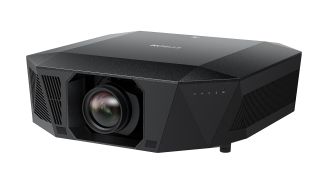Epson’s super-bright new Q-Series 4K 120Hz projectors could be the ultimate gaming displays
- Epson has launched a trio of new 3LCD laser projectors
- The new models have 4K 120Hz support and a brightness of up to 10,000 lumens
- High brightness and a living room-friendly design make the Q series an alternative to microLED TVs
With CEDIA Expo, a showcase for the latest and greatest in home theater technology, just around the corner (September 5-7, 2024), the new gear announcements are pouring in. First up is Epson, which has just released news of the Epson Q-Series, a trio of new 3LCD laser projectors aimed at the high-end custom installation market.
The Epson Q series consists of three high-brightness models that are designed for multi-functional living spaces. However, like the best 4K projectors, they can also be installed in traditional home cinema environments and feature the contrast-enhancing UltraBlack technology found in previous models such as the Epson LS12000.
The entry-level Q-Series is the QB1000 ($7,999, approx. £6,160 / AU$11,900)which includes Epson’s VRX Cinema Lens and features dual HDMI 2.1 inputs with 4K 120Hz and ALLM support. With its HDMI 2.1 connections and a claimed input lag of less than 20ms, the QB1000 could be the perfect big screen gaming projector.
The QB1000’s brightness is rated at 3,300 lumens (colour and white) and HDR support includes HDR10+, HDR10 and HLG formats. It uses Epson’s QZX Picture Processor, has a 20,000-hour laser light source and features a 3-axis motorised lens shift for easy installation.
The QL3000 ($14,999, approximately £11,550 / AU$22,300) and QL7000 ($29,999, about £23,100 / AU$44,600) are “body only” projectors that can be combined with any of Epson’s High-Precision lenses. This design allows for a wide range of installation options, including ultra-short throw floor- or ceiling-mounted setups.
Epson’s QL3000 and QL7000 offer the same features as the QB1000. They’re rated at up to 6,000 and 10,000 lumens, respectively, and support screen sizes up to 300 inches. According to Epson, these new models are more compact than their high-brightness rivals, something made possible by a new, smaller light source with a vapor chamber heatsink, making them better suited to bright living spaces. Both projectors are available in black or white and have a unique, angular casing that should also fit into any room they’re installed in.

Epson Q Series: A Cheaper Alternative to MicroLED TVs?
With its new Q-Series projectors, Epson is taking on a range of display competitors in the high-end custom installation space. Chief among them are flagship projectors from brands like Sony, Barco and Digital Projection, but massive microLED video walls also seem to be in the sights.
By making the new projectors compact and design-focused, Epson should gain a competitive edge in the high-brightness projector market, which is dominated by models with an industrial look that don’t really fit into a typical living room environment.
Projectors like the Sony VPL-GTZ380, a model rated at the same 10,000 lumens of brightness as the Epson QL7000, are quite large and best hidden from view. Equally important, they’re hugely expensive, with the Sony priced at $80,000 compared to the QL7000’s $29,999.
One appealing feature of Epson’s two new flagship projectors is the option to pair them with an ultra-short throw lens. This allows the projector to be installed close to a screen in a cabinet or on a ceiling, rather than requiring a long throw distance to project large-scale images. The best ultra-short throw projectors, such as the Epson LS800, are already bright enough to be installed in typical living rooms, but cranking the brightness up to the 6,000-10,000 lumens range makes images even more vibrant and dynamic. And with prices starting at $29,999 for the projector, Epson’s new models also offer a budget-friendly alternative to massive microLED TVs, which currently sit in the $100,000-plus range.
The QB1000 will be available in September 2024, with the QL3000 and QL7000 coming in October 2024. We look forward to reporting more on both at CEDIA Expo 2024, where Ny Breaking will be on site for Home Theater Week coverage.
